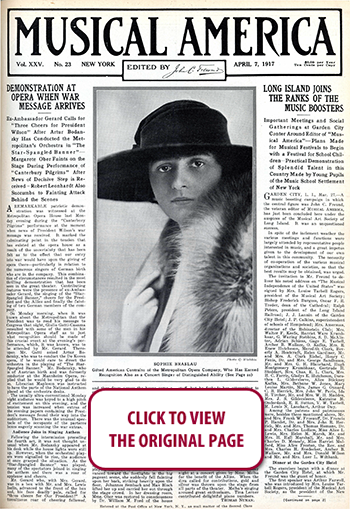 100 YEARS AGO IN MUSICAL AMERICA (189)
100 YEARS AGO IN MUSICAL AMERICA (189)
April 7, 1917
Page 1
DEMONSTRATION AT OPERA WHEN WAR MESSAGE ARRIVES
Ex-Ambassador Gerard Calls for “Three Cheers for President Wilson” After Artur Bodanzky Has Conducted the Metropolitan’s Orchestra in “The Star-Spangled Banner” Margarete Ober Faints on the Stage During Performance of “Canterbury Pilgrims” After News of Decisive Step is Received—Robert Leonhardt Also Succumbs to Fainting Attack Behind the Scenes
A REMARKABLE patriotic demonstration was witnessed at the Metropolitan Opera House last Monday evening during the “Canterbury Pilgrims” performance at the moment when news of President Wilson’s war message was received. It marked the culminating point in the tension that has existed at the opera house as a result of the uncertainty that has been felt as to the effect that our entry into war would have upon the giving of opera there—particularly in relation to the numerous singers of German birth who are in the company. This combination of circumstances resulted in the most thrilling demonstration that has been seen in the great theater. Contributing features were the presence of ex-Ambassador Gerard, the singing of the “Star-Spangled Banner,” cheers for the President and the Allies and finally the fainting of two German members of the company.
On Monday morning, when it was known about the Metropolitan that the President was to read his message to Congress that night, Giulio Gatti-Casazza consulted with some of the men in his Metropolitan Opera staff as to just what recognition should be made of this crucial event at the evening’s performance, which, it was known, was to be attended by Mr. Gerard. Thereupon Mr. Gatti asked Artur Bodanzky, who was to conduct the De Koven opera, if he would care to direct the orchestra in the playing of “The Star-Spangled Banner.” Mr. Bodanzky, who is of Austrian birth and was formerly conductor at the Mannheim Opera, replied that he would be very glad to do so. Librarian Mapleson was instructed to have the parts of the National Anthem placed at the orchestra desks.
The usually ultra-conventional Monday night audience was keyed to a high pitch of excitement on this evening, and the tension was increased when extras of the evening papers containing the President’s message found their way into the auditorium. There was the unusual spectacle of the occupants of the parterre boxes eagerly scanning the war extras.
Audience Joins in Singing Anthem
Following the intermission preceding the fourth act, it was not thought unusual when Mr. Bodanzky appeared at his desk while the house lights were still up. However, when the orchestral players were signaled to rise, the audience at once grasped the situation. As the “Star-Spangled Banner” was played, many of the spectators joined in singing the anthem and there was a roar of applause and cheers.
Mr. Gerard who, with Mrs. Gerard was in a box with Mr. and Mrs. Lewis Iselin, advanced to the front of the box and, his face deadly pale, called for “three cheers for Our President!” A tumultuous roar of cheering followed, and then from across the house came a cry, “Three cheers for Mr. Gerard!” These also were given lustily. Then came cheers for “Our allies” and for the army and navy which brought a noisy response. Seeing that the tumult showed no signs of dying out, Mr. Bodanzky again led the orchestra in “The Star-Spangled Banner.” This time the entire audience united in the singing, which was animated by an inspiring patriotic fervor.
Mme. Ober Faints
After this the performance went on, and the audience settled down quietly to listen to the final act of the American opera. The thrills, however, were not yet ended. Margarete Ober, who was formerly one of the admired singers at the Kaiser’s own opera house in Berlin, was playing the Wife of Bath and as she advanced toward the footlights in the big pageant scene, she suddenly fell fainting upon her back, striking heavily upon the floor. Johannes Sembach and Max Bloch lifted her up and carried her out through the stage crowd. In her dressing room, Mme. Ober was restored to consciousness by Dr. William M. Ford of the house staff, but he forbade her attempting to continue the performance.
Immediately following Mme. Ober’s fainting, the orchestra continued to play the De Koven score, but there was only a fragmentary response from the singers. So great was the excitement on the stage that the performers were unable to give coherent attention to their work and the remainder of the act was done in a desultory fashion. Behind the scenes there was equal agitation, especially when another member of the company fainted—Robert Leonhardt, the German baritone. He, too, was speedily revived.




 RENT A PHOTO
RENT A PHOTO





